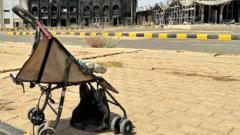The heart of Khartoum, once a vibrant capital of Sudan, now resonates with silence and devastation following a grueling conflict. After the army’s recent victory in reclaiming the city from the Rapid Support Forces (RSF), the path ahead for residents is filled with both uncertainty and flickers of hope as they navigate the ruins of their past lives.
Walking through the city lately reclaimed by the army, one cannot escape the sight of destruction—burnt buildings, shattered glass, and abandoned vehicles litter the streets. The long battle, ignited by a power struggle between the army and the RSF, claimed an estimated 150,000 lives and altered the very fabric of daily existence for many.
The once-bustling presidential palace stands in tatters, looted and scarred from prior occupation. Soldiers celebrate Eid within its remnants, a poignant moment mixed with the macabre realities of war. "It is a symbol of our dignity," one soldier remarked, even as he tread on debris where history met tragedy.
Khartoum's central landmarks mirror this sense of loss. The international airport lies in ruin, serving as a graveyard for aircraft, while the area surrounding the British embassy bears witness to the chaos with RSF slogans still scrawled across damaged walls. Assessment of the scene reveals the magnitude of the calamity—a stark contrast to the momentary festive spirit that has begun to emerge with the conclusion of local celebrations.
In neighborhoods like al-Jeraif West, pockets of community have sprung back to life, with activists like Duaa Tariq, previously steadfast during the conflict, bolstering resilience through local kitchens. Rekindling a sense of normalcy, they mark the first Eid in two years with renewed acceptance, yet the burden of war lingers heavily in their hearts.
"The fear is still here, yet we feel a shift," reflects a local elder who, despite hunger and trauma, emphasizes the values of freedom and kinship. Others express a yearning for rebuilding their lives while fearing for their children's future, encapsulating the conflicts' psychological scars that need addressing.
As the streets of Khartoum breathe a tentative hope, uncertainty looms over the future of both the city and its people. Amid the question of what lies ahead for civil society, freedom fighters, and daily life post-conflict, there remains an unyielding spirit among residents who wish to see their capital rise anew, echoing the hopeful sentiment of a nation yearning for peace and reconstruction, along with a collective prayer for their neighbors in war-torn regions like Darfur.



















